Brexit: UK's Negotiation with EU, Impacts and Alternatives
VerifiedAdded on 2021/02/19
|10
|3735
|31
Report
AI Summary
This report provides a comprehensive analysis of Brexit, examining the United Kingdom's withdrawal from the European Union. It begins with an introduction to Brexit and its impact on political, public, and market sectors. The report delves into the negotiation packages between the UK and the EU, outlining key areas of discussion and potential agreements. It then explores the disadvantages the UK faces due to Brexit, including the loss of freedom of movement, potential social damage, and impacts on foreign affairs. The report also evaluates various alternatives for handling the challenges of Brexit, such as customs unions, common market options, and potential referendums. The analysis includes impacts on GDP, employment, and public finances. The report also includes BATNA (Best Alternative to a Negotiated Agreement) analysis, and concludes with a summary of the key findings and implications of Brexit for the UK and EU.

Negotiation
Table of Contents
1
Table of Contents
1
Paraphrase This Document
Need a fresh take? Get an instant paraphrase of this document with our AI Paraphraser
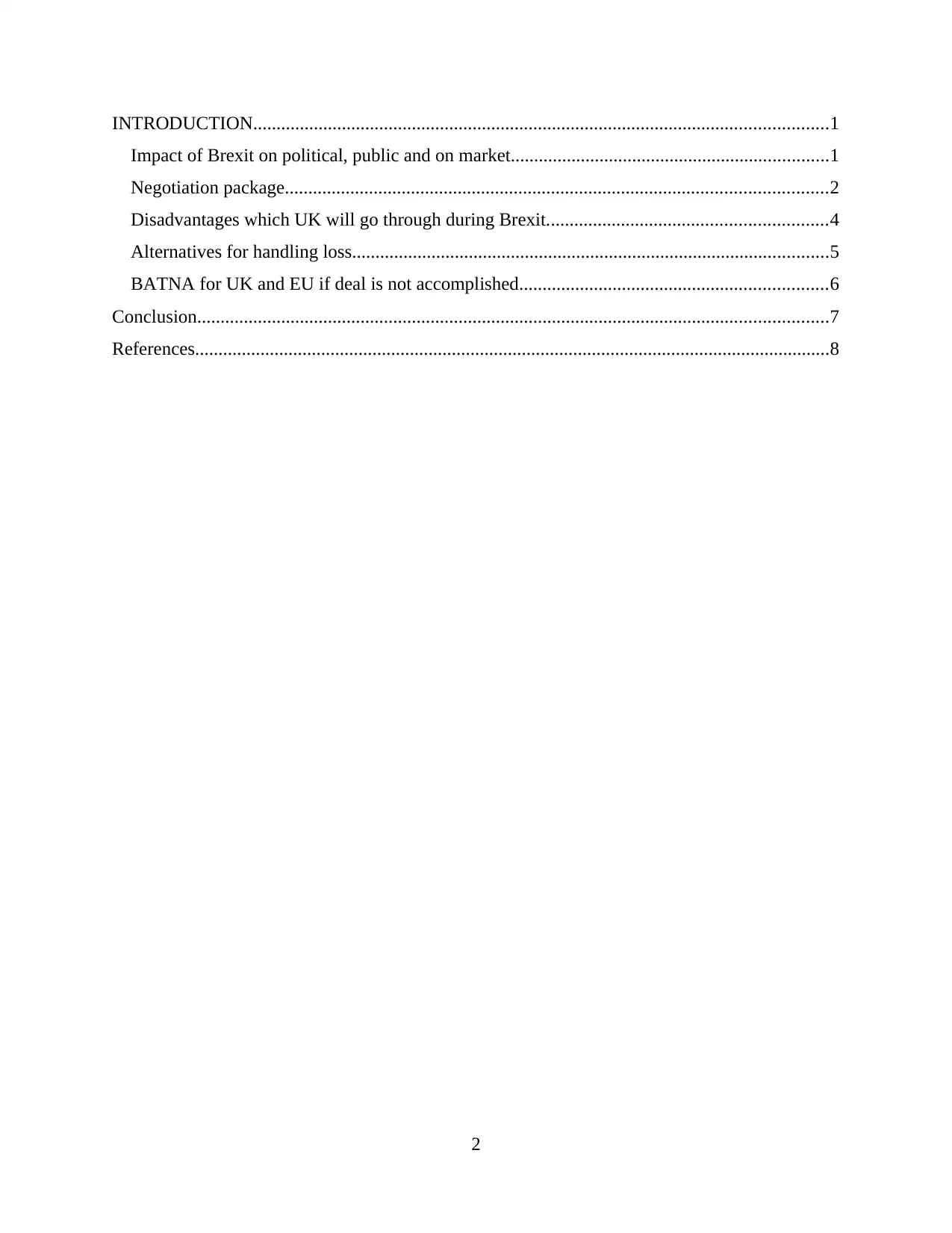
INTRODUCTION...........................................................................................................................1
Impact of Brexit on political, public and on market....................................................................1
Negotiation package....................................................................................................................2
Disadvantages which UK will go through during Brexit............................................................4
Alternatives for handling loss......................................................................................................5
BATNA for UK and EU if deal is not accomplished..................................................................6
Conclusion.......................................................................................................................................7
References........................................................................................................................................8
2
Impact of Brexit on political, public and on market....................................................................1
Negotiation package....................................................................................................................2
Disadvantages which UK will go through during Brexit............................................................4
Alternatives for handling loss......................................................................................................5
BATNA for UK and EU if deal is not accomplished..................................................................6
Conclusion.......................................................................................................................................7
References........................................................................................................................................8
2
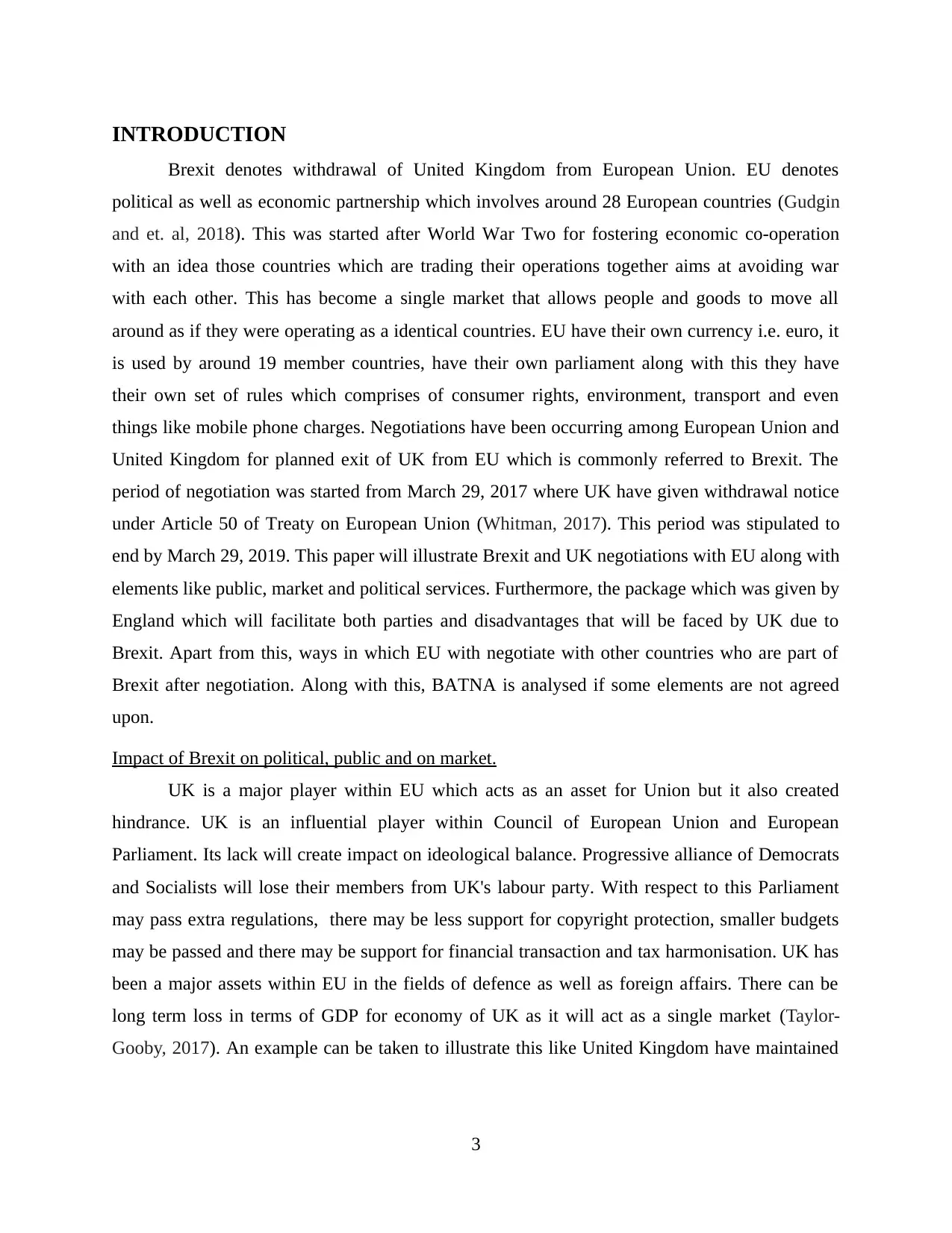
INTRODUCTION
Brexit denotes withdrawal of United Kingdom from European Union. EU denotes
political as well as economic partnership which involves around 28 European countries (Gudgin
and et. al, 2018). This was started after World War Two for fostering economic co-operation
with an idea those countries which are trading their operations together aims at avoiding war
with each other. This has become a single market that allows people and goods to move all
around as if they were operating as a identical countries. EU have their own currency i.e. euro, it
is used by around 19 member countries, have their own parliament along with this they have
their own set of rules which comprises of consumer rights, environment, transport and even
things like mobile phone charges. Negotiations have been occurring among European Union and
United Kingdom for planned exit of UK from EU which is commonly referred to Brexit. The
period of negotiation was started from March 29, 2017 where UK have given withdrawal notice
under Article 50 of Treaty on European Union (Whitman, 2017). This period was stipulated to
end by March 29, 2019. This paper will illustrate Brexit and UK negotiations with EU along with
elements like public, market and political services. Furthermore, the package which was given by
England which will facilitate both parties and disadvantages that will be faced by UK due to
Brexit. Apart from this, ways in which EU with negotiate with other countries who are part of
Brexit after negotiation. Along with this, BATNA is analysed if some elements are not agreed
upon.
Impact of Brexit on political, public and on market.
UK is a major player within EU which acts as an asset for Union but it also created
hindrance. UK is an influential player within Council of European Union and European
Parliament. Its lack will create impact on ideological balance. Progressive alliance of Democrats
and Socialists will lose their members from UK's labour party. With respect to this Parliament
may pass extra regulations, there may be less support for copyright protection, smaller budgets
may be passed and there may be support for financial transaction and tax harmonisation. UK has
been a major assets within EU in the fields of defence as well as foreign affairs. There can be
long term loss in terms of GDP for economy of UK as it will act as a single market (Taylor-
Gooby, 2017). An example can be taken to illustrate this like United Kingdom have maintained
3
Brexit denotes withdrawal of United Kingdom from European Union. EU denotes
political as well as economic partnership which involves around 28 European countries (Gudgin
and et. al, 2018). This was started after World War Two for fostering economic co-operation
with an idea those countries which are trading their operations together aims at avoiding war
with each other. This has become a single market that allows people and goods to move all
around as if they were operating as a identical countries. EU have their own currency i.e. euro, it
is used by around 19 member countries, have their own parliament along with this they have
their own set of rules which comprises of consumer rights, environment, transport and even
things like mobile phone charges. Negotiations have been occurring among European Union and
United Kingdom for planned exit of UK from EU which is commonly referred to Brexit. The
period of negotiation was started from March 29, 2017 where UK have given withdrawal notice
under Article 50 of Treaty on European Union (Whitman, 2017). This period was stipulated to
end by March 29, 2019. This paper will illustrate Brexit and UK negotiations with EU along with
elements like public, market and political services. Furthermore, the package which was given by
England which will facilitate both parties and disadvantages that will be faced by UK due to
Brexit. Apart from this, ways in which EU with negotiate with other countries who are part of
Brexit after negotiation. Along with this, BATNA is analysed if some elements are not agreed
upon.
Impact of Brexit on political, public and on market.
UK is a major player within EU which acts as an asset for Union but it also created
hindrance. UK is an influential player within Council of European Union and European
Parliament. Its lack will create impact on ideological balance. Progressive alliance of Democrats
and Socialists will lose their members from UK's labour party. With respect to this Parliament
may pass extra regulations, there may be less support for copyright protection, smaller budgets
may be passed and there may be support for financial transaction and tax harmonisation. UK has
been a major assets within EU in the fields of defence as well as foreign affairs. There can be
long term loss in terms of GDP for economy of UK as it will act as a single market (Taylor-
Gooby, 2017). An example can be taken to illustrate this like United Kingdom have maintained
3
⊘ This is a preview!⊘
Do you want full access?
Subscribe today to unlock all pages.

Trusted by 1+ million students worldwide
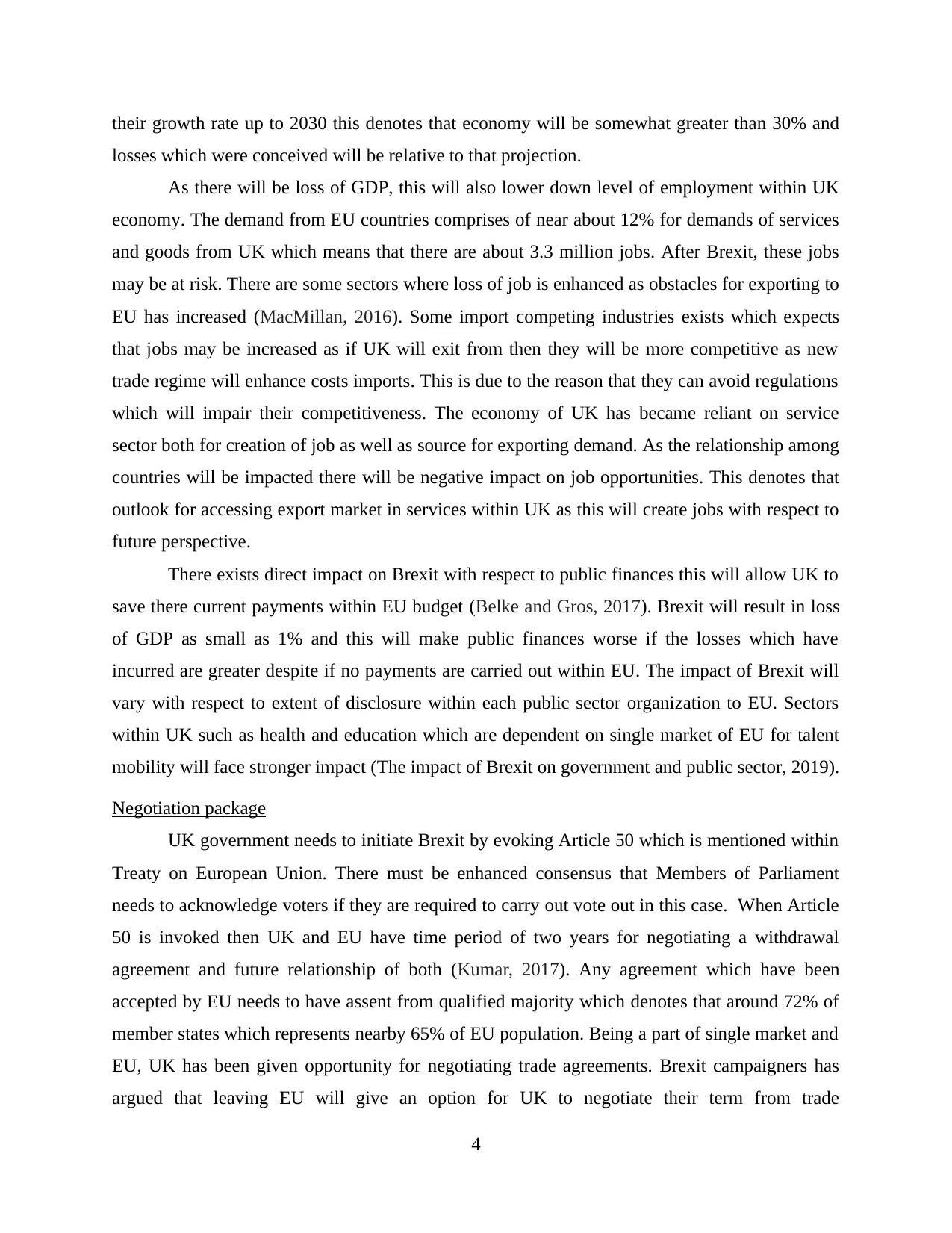
their growth rate up to 2030 this denotes that economy will be somewhat greater than 30% and
losses which were conceived will be relative to that projection.
As there will be loss of GDP, this will also lower down level of employment within UK
economy. The demand from EU countries comprises of near about 12% for demands of services
and goods from UK which means that there are about 3.3 million jobs. After Brexit, these jobs
may be at risk. There are some sectors where loss of job is enhanced as obstacles for exporting to
EU has increased (MacMillan, 2016). Some import competing industries exists which expects
that jobs may be increased as if UK will exit from then they will be more competitive as new
trade regime will enhance costs imports. This is due to the reason that they can avoid regulations
which will impair their competitiveness. The economy of UK has became reliant on service
sector both for creation of job as well as source for exporting demand. As the relationship among
countries will be impacted there will be negative impact on job opportunities. This denotes that
outlook for accessing export market in services within UK as this will create jobs with respect to
future perspective.
There exists direct impact on Brexit with respect to public finances this will allow UK to
save there current payments within EU budget (Belke and Gros, 2017). Brexit will result in loss
of GDP as small as 1% and this will make public finances worse if the losses which have
incurred are greater despite if no payments are carried out within EU. The impact of Brexit will
vary with respect to extent of disclosure within each public sector organization to EU. Sectors
within UK such as health and education which are dependent on single market of EU for talent
mobility will face stronger impact (The impact of Brexit on government and public sector, 2019).
Negotiation package
UK government needs to initiate Brexit by evoking Article 50 which is mentioned within
Treaty on European Union. There must be enhanced consensus that Members of Parliament
needs to acknowledge voters if they are required to carry out vote out in this case. When Article
50 is invoked then UK and EU have time period of two years for negotiating a withdrawal
agreement and future relationship of both (Kumar, 2017). Any agreement which have been
accepted by EU needs to have assent from qualified majority which denotes that around 72% of
member states which represents nearby 65% of EU population. Being a part of single market and
EU, UK has been given opportunity for negotiating trade agreements. Brexit campaigners has
argued that leaving EU will give an option for UK to negotiate their term from trade
4
losses which were conceived will be relative to that projection.
As there will be loss of GDP, this will also lower down level of employment within UK
economy. The demand from EU countries comprises of near about 12% for demands of services
and goods from UK which means that there are about 3.3 million jobs. After Brexit, these jobs
may be at risk. There are some sectors where loss of job is enhanced as obstacles for exporting to
EU has increased (MacMillan, 2016). Some import competing industries exists which expects
that jobs may be increased as if UK will exit from then they will be more competitive as new
trade regime will enhance costs imports. This is due to the reason that they can avoid regulations
which will impair their competitiveness. The economy of UK has became reliant on service
sector both for creation of job as well as source for exporting demand. As the relationship among
countries will be impacted there will be negative impact on job opportunities. This denotes that
outlook for accessing export market in services within UK as this will create jobs with respect to
future perspective.
There exists direct impact on Brexit with respect to public finances this will allow UK to
save there current payments within EU budget (Belke and Gros, 2017). Brexit will result in loss
of GDP as small as 1% and this will make public finances worse if the losses which have
incurred are greater despite if no payments are carried out within EU. The impact of Brexit will
vary with respect to extent of disclosure within each public sector organization to EU. Sectors
within UK such as health and education which are dependent on single market of EU for talent
mobility will face stronger impact (The impact of Brexit on government and public sector, 2019).
Negotiation package
UK government needs to initiate Brexit by evoking Article 50 which is mentioned within
Treaty on European Union. There must be enhanced consensus that Members of Parliament
needs to acknowledge voters if they are required to carry out vote out in this case. When Article
50 is invoked then UK and EU have time period of two years for negotiating a withdrawal
agreement and future relationship of both (Kumar, 2017). Any agreement which have been
accepted by EU needs to have assent from qualified majority which denotes that around 72% of
member states which represents nearby 65% of EU population. Being a part of single market and
EU, UK has been given opportunity for negotiating trade agreements. Brexit campaigners has
argued that leaving EU will give an option for UK to negotiate their term from trade
4
Paraphrase This Document
Need a fresh take? Get an instant paraphrase of this document with our AI Paraphraser
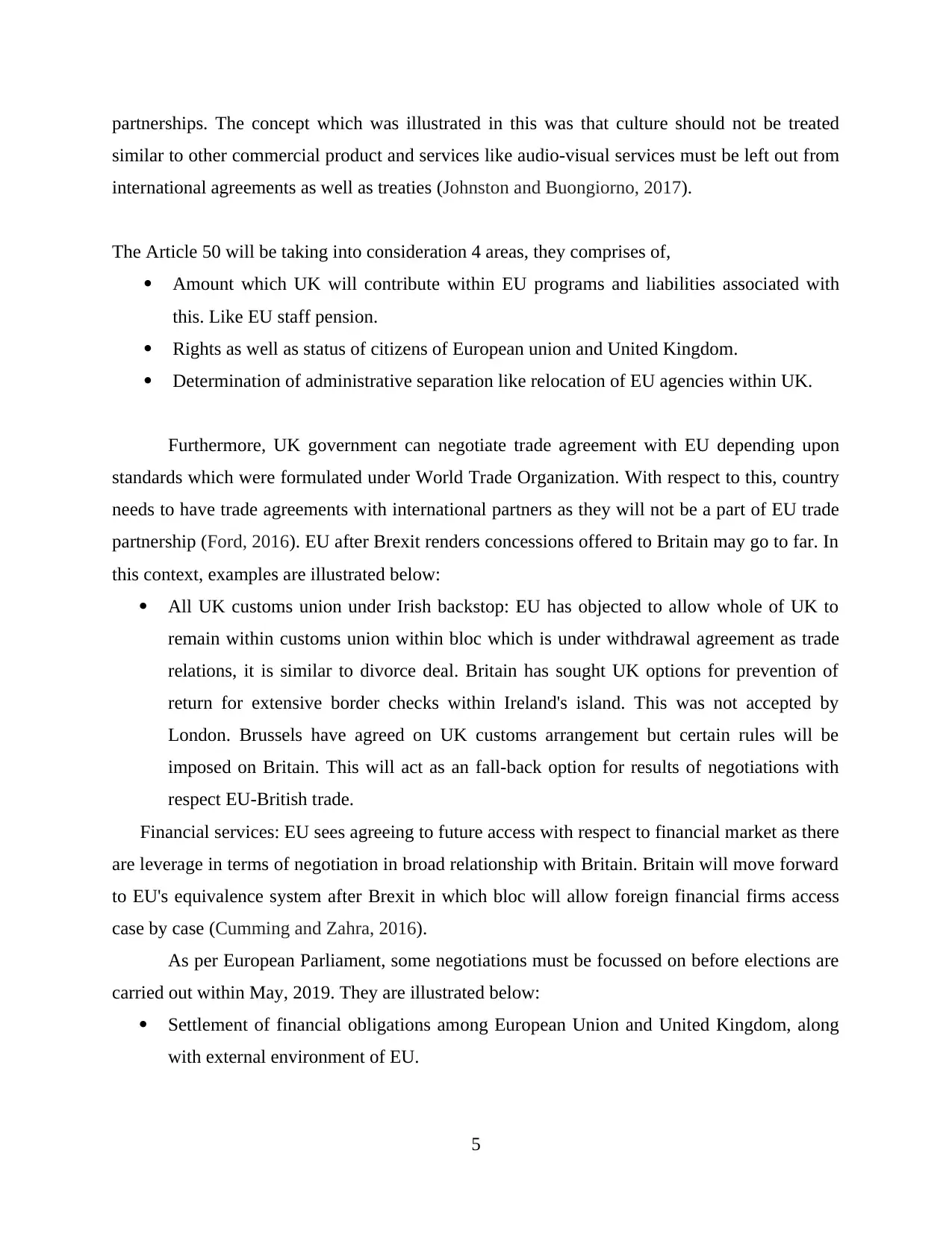
partnerships. The concept which was illustrated in this was that culture should not be treated
similar to other commercial product and services like audio-visual services must be left out from
international agreements as well as treaties (Johnston and Buongiorno, 2017).
The Article 50 will be taking into consideration 4 areas, they comprises of,
Amount which UK will contribute within EU programs and liabilities associated with
this. Like EU staff pension.
Rights as well as status of citizens of European union and United Kingdom.
Determination of administrative separation like relocation of EU agencies within UK.
Furthermore, UK government can negotiate trade agreement with EU depending upon
standards which were formulated under World Trade Organization. With respect to this, country
needs to have trade agreements with international partners as they will not be a part of EU trade
partnership (Ford, 2016). EU after Brexit renders concessions offered to Britain may go to far. In
this context, examples are illustrated below:
All UK customs union under Irish backstop: EU has objected to allow whole of UK to
remain within customs union within bloc which is under withdrawal agreement as trade
relations, it is similar to divorce deal. Britain has sought UK options for prevention of
return for extensive border checks within Ireland's island. This was not accepted by
London. Brussels have agreed on UK customs arrangement but certain rules will be
imposed on Britain. This will act as an fall-back option for results of negotiations with
respect EU-British trade.
Financial services: EU sees agreeing to future access with respect to financial market as there
are leverage in terms of negotiation in broad relationship with Britain. Britain will move forward
to EU's equivalence system after Brexit in which bloc will allow foreign financial firms access
case by case (Cumming and Zahra, 2016).
As per European Parliament, some negotiations must be focussed on before elections are
carried out within May, 2019. They are illustrated below:
Settlement of financial obligations among European Union and United Kingdom, along
with external environment of EU.
5
similar to other commercial product and services like audio-visual services must be left out from
international agreements as well as treaties (Johnston and Buongiorno, 2017).
The Article 50 will be taking into consideration 4 areas, they comprises of,
Amount which UK will contribute within EU programs and liabilities associated with
this. Like EU staff pension.
Rights as well as status of citizens of European union and United Kingdom.
Determination of administrative separation like relocation of EU agencies within UK.
Furthermore, UK government can negotiate trade agreement with EU depending upon
standards which were formulated under World Trade Organization. With respect to this, country
needs to have trade agreements with international partners as they will not be a part of EU trade
partnership (Ford, 2016). EU after Brexit renders concessions offered to Britain may go to far. In
this context, examples are illustrated below:
All UK customs union under Irish backstop: EU has objected to allow whole of UK to
remain within customs union within bloc which is under withdrawal agreement as trade
relations, it is similar to divorce deal. Britain has sought UK options for prevention of
return for extensive border checks within Ireland's island. This was not accepted by
London. Brussels have agreed on UK customs arrangement but certain rules will be
imposed on Britain. This will act as an fall-back option for results of negotiations with
respect EU-British trade.
Financial services: EU sees agreeing to future access with respect to financial market as there
are leverage in terms of negotiation in broad relationship with Britain. Britain will move forward
to EU's equivalence system after Brexit in which bloc will allow foreign financial firms access
case by case (Cumming and Zahra, 2016).
As per European Parliament, some negotiations must be focussed on before elections are
carried out within May, 2019. They are illustrated below:
Settlement of financial obligations among European Union and United Kingdom, along
with external environment of EU.
5
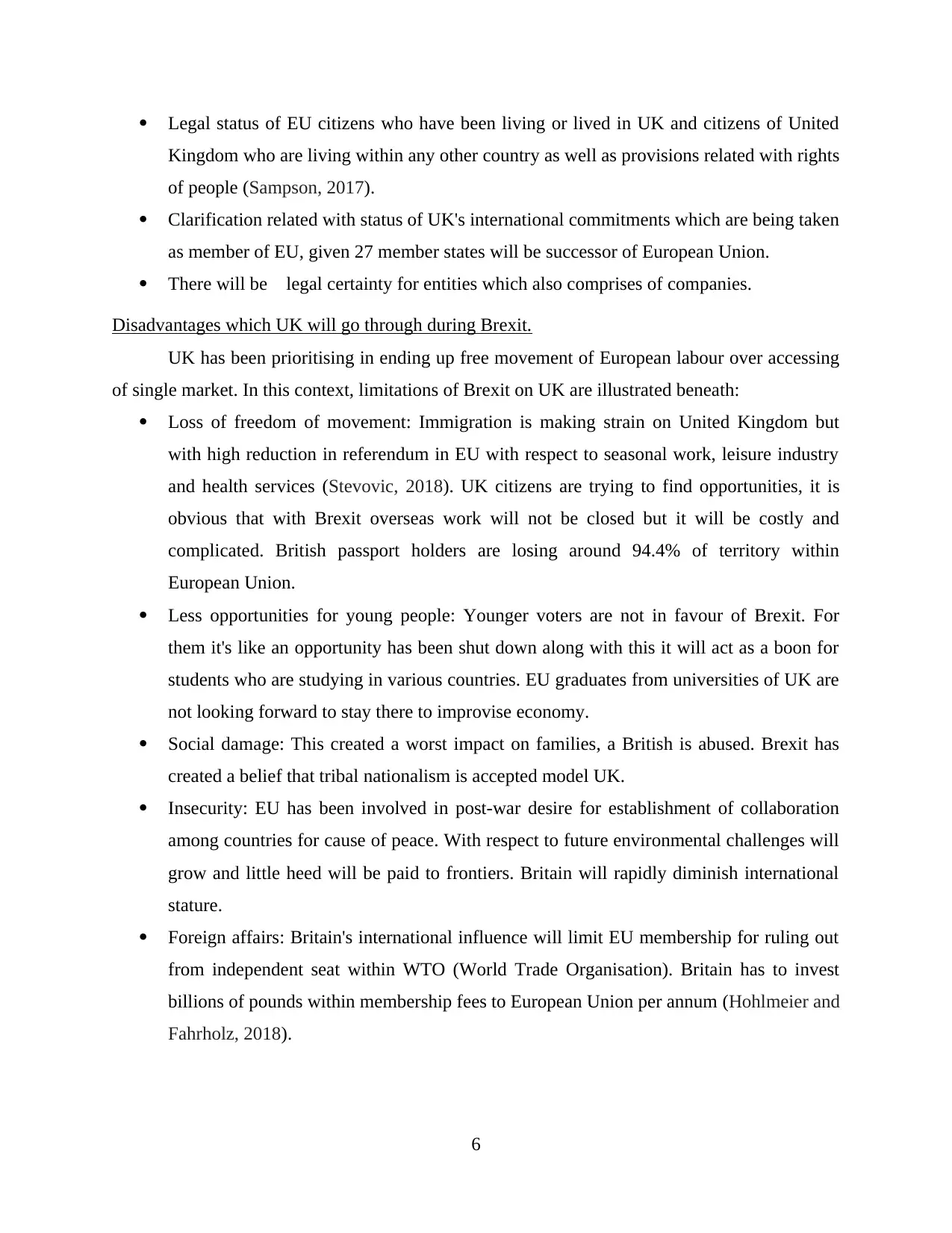
Legal status of EU citizens who have been living or lived in UK and citizens of United
Kingdom who are living within any other country as well as provisions related with rights
of people (Sampson, 2017).
Clarification related with status of UK's international commitments which are being taken
as member of EU, given 27 member states will be successor of European Union.
There will be legal certainty for entities which also comprises of companies.
Disadvantages which UK will go through during Brexit.
UK has been prioritising in ending up free movement of European labour over accessing
of single market. In this context, limitations of Brexit on UK are illustrated beneath:
Loss of freedom of movement: Immigration is making strain on United Kingdom but
with high reduction in referendum in EU with respect to seasonal work, leisure industry
and health services (Stevovic, 2018). UK citizens are trying to find opportunities, it is
obvious that with Brexit overseas work will not be closed but it will be costly and
complicated. British passport holders are losing around 94.4% of territory within
European Union.
Less opportunities for young people: Younger voters are not in favour of Brexit. For
them it's like an opportunity has been shut down along with this it will act as a boon for
students who are studying in various countries. EU graduates from universities of UK are
not looking forward to stay there to improvise economy.
Social damage: This created a worst impact on families, a British is abused. Brexit has
created a belief that tribal nationalism is accepted model UK.
Insecurity: EU has been involved in post-war desire for establishment of collaboration
among countries for cause of peace. With respect to future environmental challenges will
grow and little heed will be paid to frontiers. Britain will rapidly diminish international
stature.
Foreign affairs: Britain's international influence will limit EU membership for ruling out
from independent seat within WTO (World Trade Organisation). Britain has to invest
billions of pounds within membership fees to European Union per annum (Hohlmeier and
Fahrholz, 2018).
6
Kingdom who are living within any other country as well as provisions related with rights
of people (Sampson, 2017).
Clarification related with status of UK's international commitments which are being taken
as member of EU, given 27 member states will be successor of European Union.
There will be legal certainty for entities which also comprises of companies.
Disadvantages which UK will go through during Brexit.
UK has been prioritising in ending up free movement of European labour over accessing
of single market. In this context, limitations of Brexit on UK are illustrated beneath:
Loss of freedom of movement: Immigration is making strain on United Kingdom but
with high reduction in referendum in EU with respect to seasonal work, leisure industry
and health services (Stevovic, 2018). UK citizens are trying to find opportunities, it is
obvious that with Brexit overseas work will not be closed but it will be costly and
complicated. British passport holders are losing around 94.4% of territory within
European Union.
Less opportunities for young people: Younger voters are not in favour of Brexit. For
them it's like an opportunity has been shut down along with this it will act as a boon for
students who are studying in various countries. EU graduates from universities of UK are
not looking forward to stay there to improvise economy.
Social damage: This created a worst impact on families, a British is abused. Brexit has
created a belief that tribal nationalism is accepted model UK.
Insecurity: EU has been involved in post-war desire for establishment of collaboration
among countries for cause of peace. With respect to future environmental challenges will
grow and little heed will be paid to frontiers. Britain will rapidly diminish international
stature.
Foreign affairs: Britain's international influence will limit EU membership for ruling out
from independent seat within WTO (World Trade Organisation). Britain has to invest
billions of pounds within membership fees to European Union per annum (Hohlmeier and
Fahrholz, 2018).
6
⊘ This is a preview!⊘
Do you want full access?
Subscribe today to unlock all pages.

Trusted by 1+ million students worldwide
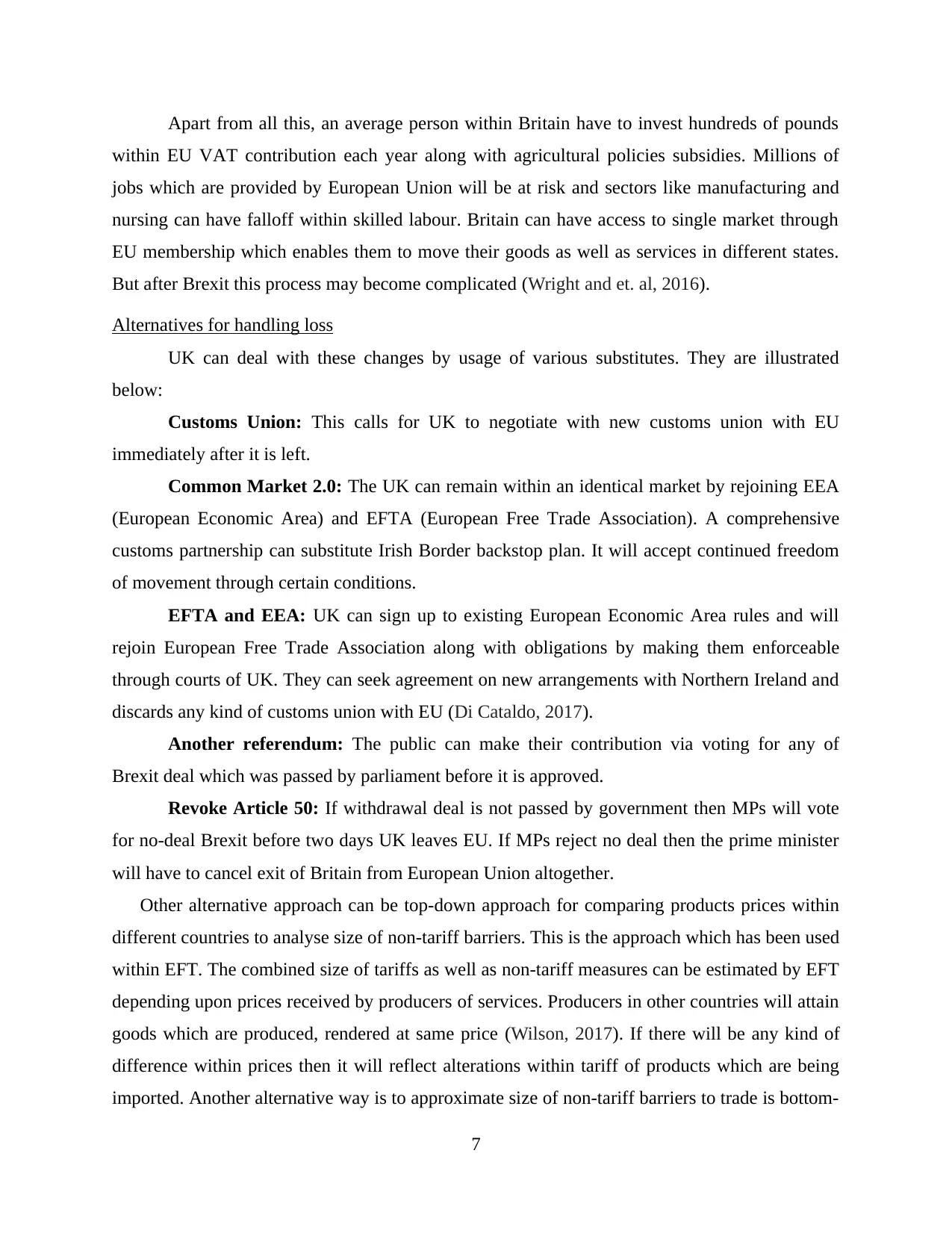
Apart from all this, an average person within Britain have to invest hundreds of pounds
within EU VAT contribution each year along with agricultural policies subsidies. Millions of
jobs which are provided by European Union will be at risk and sectors like manufacturing and
nursing can have falloff within skilled labour. Britain can have access to single market through
EU membership which enables them to move their goods as well as services in different states.
But after Brexit this process may become complicated (Wright and et. al, 2016).
Alternatives for handling loss
UK can deal with these changes by usage of various substitutes. They are illustrated
below:
Customs Union: This calls for UK to negotiate with new customs union with EU
immediately after it is left.
Common Market 2.0: The UK can remain within an identical market by rejoining EEA
(European Economic Area) and EFTA (European Free Trade Association). A comprehensive
customs partnership can substitute Irish Border backstop plan. It will accept continued freedom
of movement through certain conditions.
EFTA and EEA: UK can sign up to existing European Economic Area rules and will
rejoin European Free Trade Association along with obligations by making them enforceable
through courts of UK. They can seek agreement on new arrangements with Northern Ireland and
discards any kind of customs union with EU (Di Cataldo, 2017).
Another referendum: The public can make their contribution via voting for any of
Brexit deal which was passed by parliament before it is approved.
Revoke Article 50: If withdrawal deal is not passed by government then MPs will vote
for no-deal Brexit before two days UK leaves EU. If MPs reject no deal then the prime minister
will have to cancel exit of Britain from European Union altogether.
Other alternative approach can be top-down approach for comparing products prices within
different countries to analyse size of non-tariff barriers. This is the approach which has been used
within EFT. The combined size of tariffs as well as non-tariff measures can be estimated by EFT
depending upon prices received by producers of services. Producers in other countries will attain
goods which are produced, rendered at same price (Wilson, 2017). If there will be any kind of
difference within prices then it will reflect alterations within tariff of products which are being
imported. Another alternative way is to approximate size of non-tariff barriers to trade is bottom-
7
within EU VAT contribution each year along with agricultural policies subsidies. Millions of
jobs which are provided by European Union will be at risk and sectors like manufacturing and
nursing can have falloff within skilled labour. Britain can have access to single market through
EU membership which enables them to move their goods as well as services in different states.
But after Brexit this process may become complicated (Wright and et. al, 2016).
Alternatives for handling loss
UK can deal with these changes by usage of various substitutes. They are illustrated
below:
Customs Union: This calls for UK to negotiate with new customs union with EU
immediately after it is left.
Common Market 2.0: The UK can remain within an identical market by rejoining EEA
(European Economic Area) and EFTA (European Free Trade Association). A comprehensive
customs partnership can substitute Irish Border backstop plan. It will accept continued freedom
of movement through certain conditions.
EFTA and EEA: UK can sign up to existing European Economic Area rules and will
rejoin European Free Trade Association along with obligations by making them enforceable
through courts of UK. They can seek agreement on new arrangements with Northern Ireland and
discards any kind of customs union with EU (Di Cataldo, 2017).
Another referendum: The public can make their contribution via voting for any of
Brexit deal which was passed by parliament before it is approved.
Revoke Article 50: If withdrawal deal is not passed by government then MPs will vote
for no-deal Brexit before two days UK leaves EU. If MPs reject no deal then the prime minister
will have to cancel exit of Britain from European Union altogether.
Other alternative approach can be top-down approach for comparing products prices within
different countries to analyse size of non-tariff barriers. This is the approach which has been used
within EFT. The combined size of tariffs as well as non-tariff measures can be estimated by EFT
depending upon prices received by producers of services. Producers in other countries will attain
goods which are produced, rendered at same price (Wilson, 2017). If there will be any kind of
difference within prices then it will reflect alterations within tariff of products which are being
imported. Another alternative way is to approximate size of non-tariff barriers to trade is bottom-
7
Paraphrase This Document
Need a fresh take? Get an instant paraphrase of this document with our AI Paraphraser
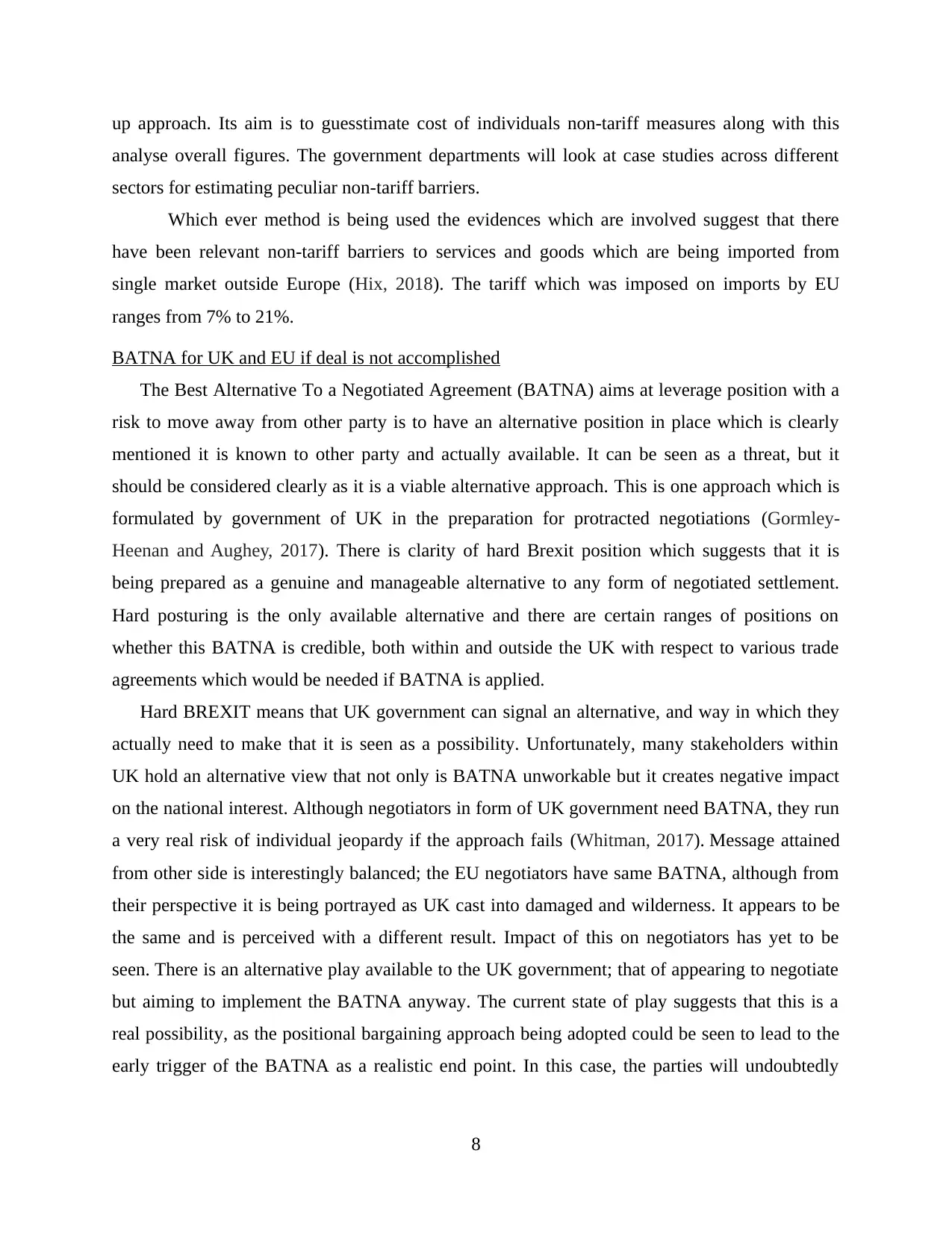
up approach. Its aim is to guesstimate cost of individuals non-tariff measures along with this
analyse overall figures. The government departments will look at case studies across different
sectors for estimating peculiar non-tariff barriers.
Which ever method is being used the evidences which are involved suggest that there
have been relevant non-tariff barriers to services and goods which are being imported from
single market outside Europe (Hix, 2018). The tariff which was imposed on imports by EU
ranges from 7% to 21%.
BATNA for UK and EU if deal is not accomplished
The Best Alternative To a Negotiated Agreement (BATNA) aims at leverage position with a
risk to move away from other party is to have an alternative position in place which is clearly
mentioned it is known to other party and actually available. It can be seen as a threat, but it
should be considered clearly as it is a viable alternative approach. This is one approach which is
formulated by government of UK in the preparation for protracted negotiations (Gormley-
Heenan and Aughey, 2017). There is clarity of hard Brexit position which suggests that it is
being prepared as a genuine and manageable alternative to any form of negotiated settlement.
Hard posturing is the only available alternative and there are certain ranges of positions on
whether this BATNA is credible, both within and outside the UK with respect to various trade
agreements which would be needed if BATNA is applied.
Hard BREXIT means that UK government can signal an alternative, and way in which they
actually need to make that it is seen as a possibility. Unfortunately, many stakeholders within
UK hold an alternative view that not only is BATNA unworkable but it creates negative impact
on the national interest. Although negotiators in form of UK government need BATNA, they run
a very real risk of individual jeopardy if the approach fails (Whitman, 2017). Message attained
from other side is interestingly balanced; the EU negotiators have same BATNA, although from
their perspective it is being portrayed as UK cast into damaged and wilderness. It appears to be
the same and is perceived with a different result. Impact of this on negotiators has yet to be
seen. There is an alternative play available to the UK government; that of appearing to negotiate
but aiming to implement the BATNA anyway. The current state of play suggests that this is a
real possibility, as the positional bargaining approach being adopted could be seen to lead to the
early trigger of the BATNA as a realistic end point. In this case, the parties will undoubtedly
8
analyse overall figures. The government departments will look at case studies across different
sectors for estimating peculiar non-tariff barriers.
Which ever method is being used the evidences which are involved suggest that there
have been relevant non-tariff barriers to services and goods which are being imported from
single market outside Europe (Hix, 2018). The tariff which was imposed on imports by EU
ranges from 7% to 21%.
BATNA for UK and EU if deal is not accomplished
The Best Alternative To a Negotiated Agreement (BATNA) aims at leverage position with a
risk to move away from other party is to have an alternative position in place which is clearly
mentioned it is known to other party and actually available. It can be seen as a threat, but it
should be considered clearly as it is a viable alternative approach. This is one approach which is
formulated by government of UK in the preparation for protracted negotiations (Gormley-
Heenan and Aughey, 2017). There is clarity of hard Brexit position which suggests that it is
being prepared as a genuine and manageable alternative to any form of negotiated settlement.
Hard posturing is the only available alternative and there are certain ranges of positions on
whether this BATNA is credible, both within and outside the UK with respect to various trade
agreements which would be needed if BATNA is applied.
Hard BREXIT means that UK government can signal an alternative, and way in which they
actually need to make that it is seen as a possibility. Unfortunately, many stakeholders within
UK hold an alternative view that not only is BATNA unworkable but it creates negative impact
on the national interest. Although negotiators in form of UK government need BATNA, they run
a very real risk of individual jeopardy if the approach fails (Whitman, 2017). Message attained
from other side is interestingly balanced; the EU negotiators have same BATNA, although from
their perspective it is being portrayed as UK cast into damaged and wilderness. It appears to be
the same and is perceived with a different result. Impact of this on negotiators has yet to be
seen. There is an alternative play available to the UK government; that of appearing to negotiate
but aiming to implement the BATNA anyway. The current state of play suggests that this is a
real possibility, as the positional bargaining approach being adopted could be seen to lead to the
early trigger of the BATNA as a realistic end point. In this case, the parties will undoubtedly
8
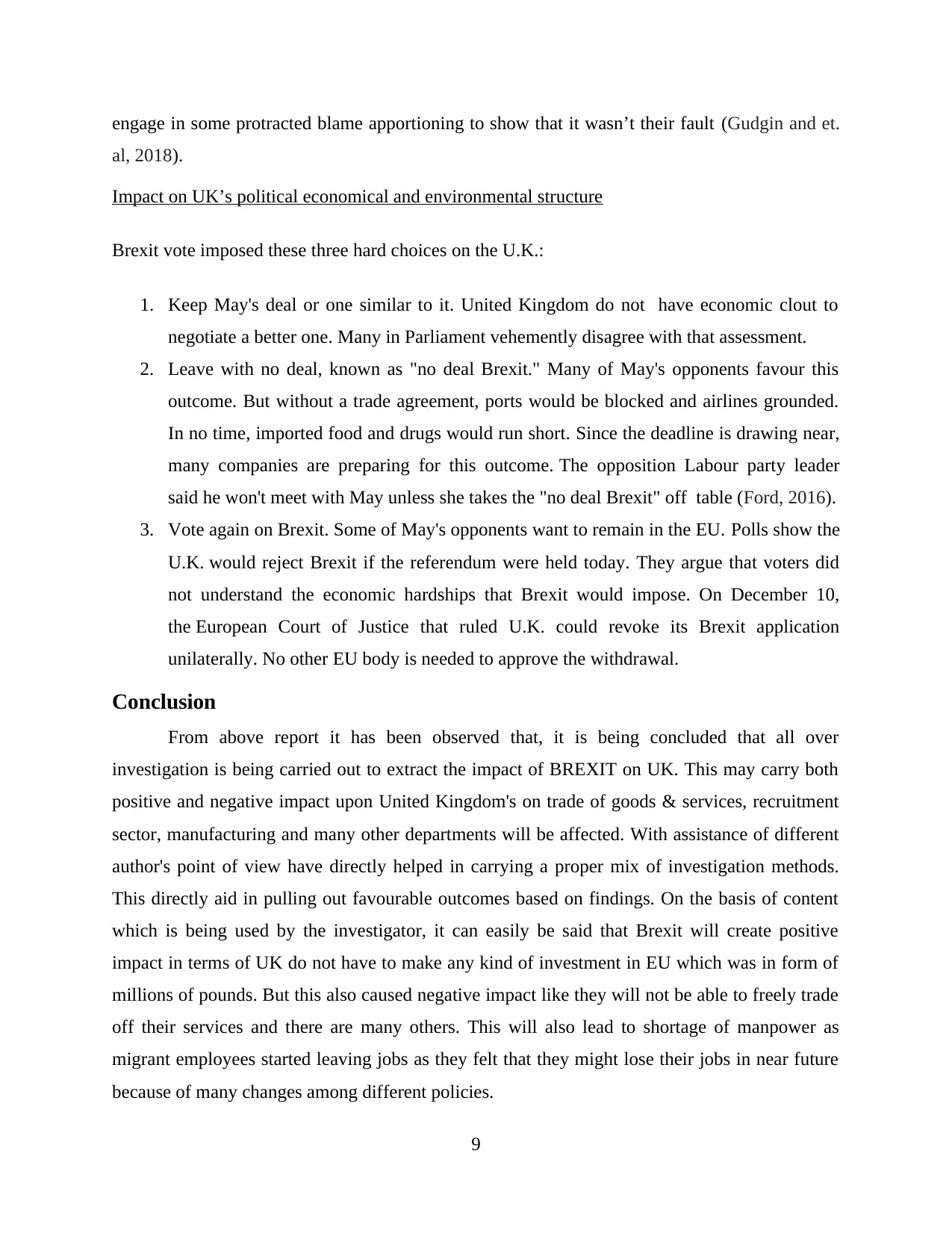
engage in some protracted blame apportioning to show that it wasn’t their fault (Gudgin and et.
al, 2018).
Impact on UK’s political economical and environmental structure
Brexit vote imposed these three hard choices on the U.K.:
1. Keep May's deal or one similar to it. United Kingdom do not have economic clout to
negotiate a better one. Many in Parliament vehemently disagree with that assessment.
2. Leave with no deal, known as "no deal Brexit." Many of May's opponents favour this
outcome. But without a trade agreement, ports would be blocked and airlines grounded.
In no time, imported food and drugs would run short. Since the deadline is drawing near,
many companies are preparing for this outcome. The opposition Labour party leader
said he won't meet with May unless she takes the "no deal Brexit" off table (Ford, 2016).
3. Vote again on Brexit. Some of May's opponents want to remain in the EU. Polls show the
U.K. would reject Brexit if the referendum were held today. They argue that voters did
not understand the economic hardships that Brexit would impose. On December 10,
the European Court of Justice that ruled U.K. could revoke its Brexit application
unilaterally. No other EU body is needed to approve the withdrawal.
Conclusion
From above report it has been observed that, it is being concluded that all over
investigation is being carried out to extract the impact of BREXIT on UK. This may carry both
positive and negative impact upon United Kingdom's on trade of goods & services, recruitment
sector, manufacturing and many other departments will be affected. With assistance of different
author's point of view have directly helped in carrying a proper mix of investigation methods.
This directly aid in pulling out favourable outcomes based on findings. On the basis of content
which is being used by the investigator, it can easily be said that Brexit will create positive
impact in terms of UK do not have to make any kind of investment in EU which was in form of
millions of pounds. But this also caused negative impact like they will not be able to freely trade
off their services and there are many others. This will also lead to shortage of manpower as
migrant employees started leaving jobs as they felt that they might lose their jobs in near future
because of many changes among different policies.
9
al, 2018).
Impact on UK’s political economical and environmental structure
Brexit vote imposed these three hard choices on the U.K.:
1. Keep May's deal or one similar to it. United Kingdom do not have economic clout to
negotiate a better one. Many in Parliament vehemently disagree with that assessment.
2. Leave with no deal, known as "no deal Brexit." Many of May's opponents favour this
outcome. But without a trade agreement, ports would be blocked and airlines grounded.
In no time, imported food and drugs would run short. Since the deadline is drawing near,
many companies are preparing for this outcome. The opposition Labour party leader
said he won't meet with May unless she takes the "no deal Brexit" off table (Ford, 2016).
3. Vote again on Brexit. Some of May's opponents want to remain in the EU. Polls show the
U.K. would reject Brexit if the referendum were held today. They argue that voters did
not understand the economic hardships that Brexit would impose. On December 10,
the European Court of Justice that ruled U.K. could revoke its Brexit application
unilaterally. No other EU body is needed to approve the withdrawal.
Conclusion
From above report it has been observed that, it is being concluded that all over
investigation is being carried out to extract the impact of BREXIT on UK. This may carry both
positive and negative impact upon United Kingdom's on trade of goods & services, recruitment
sector, manufacturing and many other departments will be affected. With assistance of different
author's point of view have directly helped in carrying a proper mix of investigation methods.
This directly aid in pulling out favourable outcomes based on findings. On the basis of content
which is being used by the investigator, it can easily be said that Brexit will create positive
impact in terms of UK do not have to make any kind of investment in EU which was in form of
millions of pounds. But this also caused negative impact like they will not be able to freely trade
off their services and there are many others. This will also lead to shortage of manpower as
migrant employees started leaving jobs as they felt that they might lose their jobs in near future
because of many changes among different policies.
9
⊘ This is a preview!⊘
Do you want full access?
Subscribe today to unlock all pages.

Trusted by 1+ million students worldwide
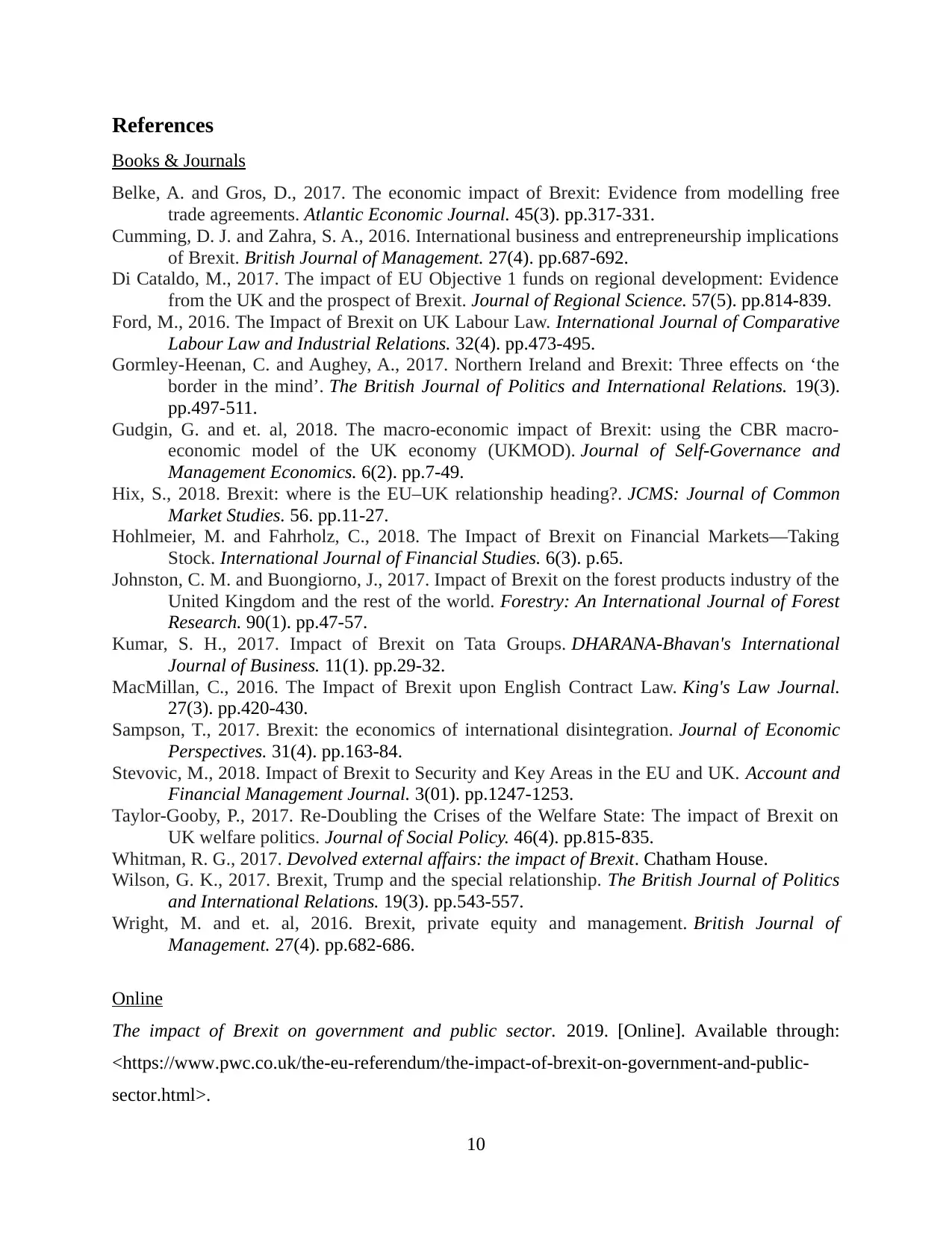
References
Books & Journals
Belke, A. and Gros, D., 2017. The economic impact of Brexit: Evidence from modelling free
trade agreements. Atlantic Economic Journal. 45(3). pp.317-331.
Cumming, D. J. and Zahra, S. A., 2016. International business and entrepreneurship implications
of Brexit. British Journal of Management. 27(4). pp.687-692.
Di Cataldo, M., 2017. The impact of EU Objective 1 funds on regional development: Evidence
from the UK and the prospect of Brexit. Journal of Regional Science. 57(5). pp.814-839.
Ford, M., 2016. The Impact of Brexit on UK Labour Law. International Journal of Comparative
Labour Law and Industrial Relations. 32(4). pp.473-495.
Gormley-Heenan, C. and Aughey, A., 2017. Northern Ireland and Brexit: Three effects on ‘the
border in the mind’. The British Journal of Politics and International Relations. 19(3).
pp.497-511.
Gudgin, G. and et. al, 2018. The macro-economic impact of Brexit: using the CBR macro-
economic model of the UK economy (UKMOD). Journal of Self-Governance and
Management Economics. 6(2). pp.7-49.
Hix, S., 2018. Brexit: where is the EU–UK relationship heading?. JCMS: Journal of Common
Market Studies. 56. pp.11-27.
Hohlmeier, M. and Fahrholz, C., 2018. The Impact of Brexit on Financial Markets—Taking
Stock. International Journal of Financial Studies. 6(3). p.65.
Johnston, C. M. and Buongiorno, J., 2017. Impact of Brexit on the forest products industry of the
United Kingdom and the rest of the world. Forestry: An International Journal of Forest
Research. 90(1). pp.47-57.
Kumar, S. H., 2017. Impact of Brexit on Tata Groups. DHARANA-Bhavan's International
Journal of Business. 11(1). pp.29-32.
MacMillan, C., 2016. The Impact of Brexit upon English Contract Law. King's Law Journal.
27(3). pp.420-430.
Sampson, T., 2017. Brexit: the economics of international disintegration. Journal of Economic
Perspectives. 31(4). pp.163-84.
Stevovic, M., 2018. Impact of Brexit to Security and Key Areas in the EU and UK. Account and
Financial Management Journal. 3(01). pp.1247-1253.
Taylor-Gooby, P., 2017. Re-Doubling the Crises of the Welfare State: The impact of Brexit on
UK welfare politics. Journal of Social Policy. 46(4). pp.815-835.
Whitman, R. G., 2017. Devolved external affairs: the impact of Brexit. Chatham House.
Wilson, G. K., 2017. Brexit, Trump and the special relationship. The British Journal of Politics
and International Relations. 19(3). pp.543-557.
Wright, M. and et. al, 2016. Brexit, private equity and management. British Journal of
Management. 27(4). pp.682-686.
Online
The impact of Brexit on government and public sector. 2019. [Online]. Available through:
<https://www.pwc.co.uk/the-eu-referendum/the-impact-of-brexit-on-government-and-public-
sector.html>.
10
Books & Journals
Belke, A. and Gros, D., 2017. The economic impact of Brexit: Evidence from modelling free
trade agreements. Atlantic Economic Journal. 45(3). pp.317-331.
Cumming, D. J. and Zahra, S. A., 2016. International business and entrepreneurship implications
of Brexit. British Journal of Management. 27(4). pp.687-692.
Di Cataldo, M., 2017. The impact of EU Objective 1 funds on regional development: Evidence
from the UK and the prospect of Brexit. Journal of Regional Science. 57(5). pp.814-839.
Ford, M., 2016. The Impact of Brexit on UK Labour Law. International Journal of Comparative
Labour Law and Industrial Relations. 32(4). pp.473-495.
Gormley-Heenan, C. and Aughey, A., 2017. Northern Ireland and Brexit: Three effects on ‘the
border in the mind’. The British Journal of Politics and International Relations. 19(3).
pp.497-511.
Gudgin, G. and et. al, 2018. The macro-economic impact of Brexit: using the CBR macro-
economic model of the UK economy (UKMOD). Journal of Self-Governance and
Management Economics. 6(2). pp.7-49.
Hix, S., 2018. Brexit: where is the EU–UK relationship heading?. JCMS: Journal of Common
Market Studies. 56. pp.11-27.
Hohlmeier, M. and Fahrholz, C., 2018. The Impact of Brexit on Financial Markets—Taking
Stock. International Journal of Financial Studies. 6(3). p.65.
Johnston, C. M. and Buongiorno, J., 2017. Impact of Brexit on the forest products industry of the
United Kingdom and the rest of the world. Forestry: An International Journal of Forest
Research. 90(1). pp.47-57.
Kumar, S. H., 2017. Impact of Brexit on Tata Groups. DHARANA-Bhavan's International
Journal of Business. 11(1). pp.29-32.
MacMillan, C., 2016. The Impact of Brexit upon English Contract Law. King's Law Journal.
27(3). pp.420-430.
Sampson, T., 2017. Brexit: the economics of international disintegration. Journal of Economic
Perspectives. 31(4). pp.163-84.
Stevovic, M., 2018. Impact of Brexit to Security and Key Areas in the EU and UK. Account and
Financial Management Journal. 3(01). pp.1247-1253.
Taylor-Gooby, P., 2017. Re-Doubling the Crises of the Welfare State: The impact of Brexit on
UK welfare politics. Journal of Social Policy. 46(4). pp.815-835.
Whitman, R. G., 2017. Devolved external affairs: the impact of Brexit. Chatham House.
Wilson, G. K., 2017. Brexit, Trump and the special relationship. The British Journal of Politics
and International Relations. 19(3). pp.543-557.
Wright, M. and et. al, 2016. Brexit, private equity and management. British Journal of
Management. 27(4). pp.682-686.
Online
The impact of Brexit on government and public sector. 2019. [Online]. Available through:
<https://www.pwc.co.uk/the-eu-referendum/the-impact-of-brexit-on-government-and-public-
sector.html>.
10
1 out of 10
Related Documents
Your All-in-One AI-Powered Toolkit for Academic Success.
+13062052269
info@desklib.com
Available 24*7 on WhatsApp / Email
![[object Object]](/_next/static/media/star-bottom.7253800d.svg)
Unlock your academic potential
Copyright © 2020–2026 A2Z Services. All Rights Reserved. Developed and managed by ZUCOL.




